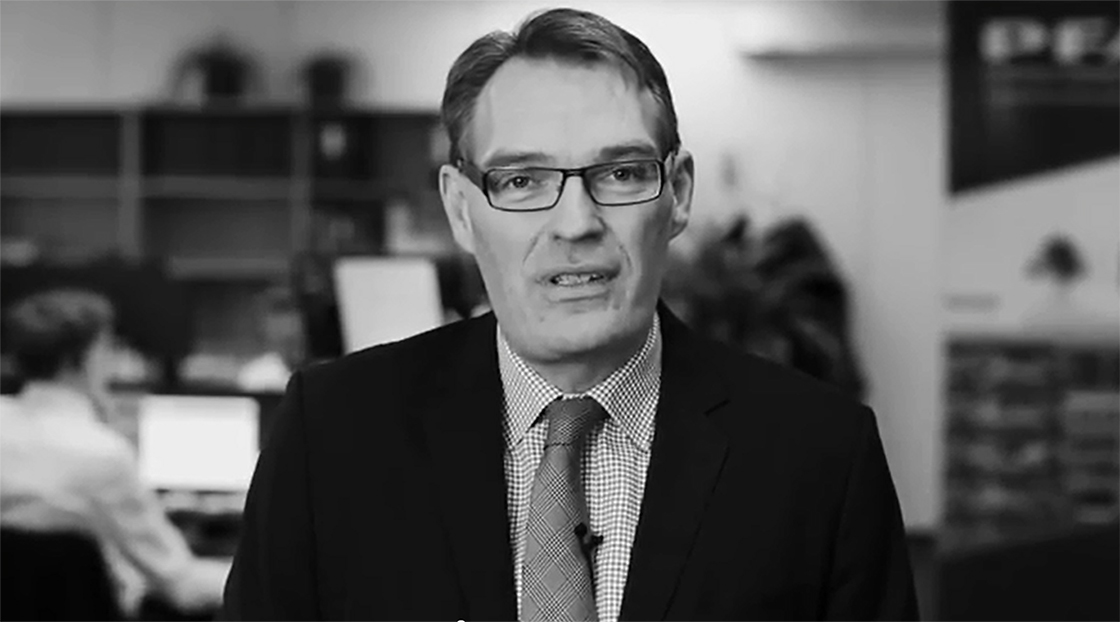Chief Strategist: The gateway to safe investments

In order to make money multiply, investors have to take risks. PFA’s highly specialised investment team has ensured strong returns for PFA’s customers in recent years. Join us behind the scenes and get investment tips from PFA's Chief Strategist Henrik Henriksen.
Henrik Henriksen explains that investments always entail a risk. However, you can ensure safer investments by preparing your portfolio for the ups and downs of the investment markets. Basically, no one knows when the markets turn – not even economists.
“Bonds do well in stormy weather, when the economy is struggling and people run for the exits. However, if you place all of your investments in bonds, you won’t benefit much when better times come around. This is important to consider when you make your investments. In the long term, you actually minimise the risk you take by investing in both bonds and shares,” Henrik Henriksen explains.
He emphasises that the best solution for you depends on how big a risk you are willing to take and how large a return you hope to receive.
Economy with a pinch of psychology
When PFA invests your money, it is first and foremost about the employees of PFA Asset Management using their knowledge and expertise to generate the best possible return for you. From a micro perspective, we analyse individual shares and financial statements, and, from a macro perspective, we look at international economic trends throughout Europe, the US, emerging markets, etc. Thus, investments are primarily about looking at economic matters, but psychology also comes into play, Henrik Henriksen explains.
“Investments are not subject to the law of gravity where a coin will drop back down when you throw it into the air. The market is driven by supply and demand along with a number of underlying factors, including psychology, greed and fear,” Henrik Henriksen says.
Invest with PFA
In addition to looking after your pension savings, PFA also offers the possibility of investing in the mutual fund PFA Invest. It is an offer for you who want to invest your available funds in a flexible manner and rest assured that your money is managed by PFA’s highly specialised investment team. PFA Invest means that you can invest your money without having to keep track of share prices, key economic data and the latest financial statements. PFA will take care of it all for you.
“PFA Invest is a simple way to invest your savings. When you buy investment certificates in PFA Invest, the investments will be managed by the same experts who invest on behalf of PFA Pension. This way, you invest with PFA so to speak,” Henrik Henriksen says.
An alternative to the low bank interest rates
At the moment, regular salary accounts yield next to no interest due to the low interest rate levels. Henrik Henriksen explains that, if you have a large amount on deposit in a bank, part of the money will over time be consumed by inflation. Therefore, it is relevant to actively consider whether you should invest the money yourself - for instance in PFA Invest. It is important that you consider this if you have a large amount of money that you do not need at the moment deposited in your bank.
You can always sell your investment certificates in PFA Invest. This means that you can place your savings in the mutual fund for a number of years with a view to buying your dream home, going on a round-the-world trip with your family or whatever else you dream of.
Five investment tips for private investors:
- Invest in a mix of shares, bonds, alternative investments, etc. Investing in bonds alone – as the situation looks at present – will yield low returns and provide poor protection against inflation and economic booms. When the share prices drop, investors often look towards safer options, which result in a rise in bond prices and vice versa. However, with the currently low level of interest rates, any bond gains will typically not be enough to make up for the share losses.
- As a private investor, it may be a good idea to invest in mutual funds such as PFA Invest. Like in PFA Plus, you can choose between different investment profiles - and many other, more specialised products. A few of the advantages of a mutual fund are that the risk is spread out and that the expenses are divided among more people.
- The interest rate levels on the global markets are still low. This means that any bank deposits yield almost no return and that, over the years, the value of your money decreases. Therefore, it doesn’t, as a starting point, pay off to have large amounts of money on deposit in banks. If you have a large sum of money that you do not need right away, it is therefore a good idea to invest it through a mutual fund.
- At present, properties are interesting for investors as they are likely to generate fairly steady returns and offer good protection against increasing inflation. PFA Pension makes it possible to invest in properties through PFA Plus (in the product You Invest).
- It is important to keep your cool and not necessarily get carried away by what everybody else does. Especially if you make high-risk investments with a long-term perspective, you will experience losses to a greater or lesser extent – losses that can typically be made up for if you invest sensibly and with a long-term perspective. This is also important to keep in mind when you choose your investment profile in PFA Pension and in PFA Invest.